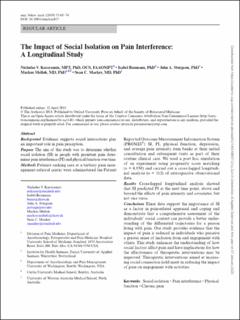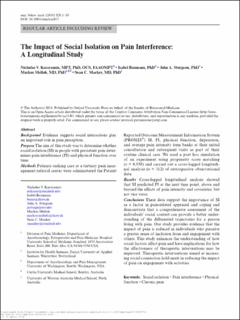Please use this identifier to cite or link to this item:
https://doi.org/10.21256/zhaw-3583Full metadata record
| DC Field | Value | Language |
|---|---|---|
| dc.contributor.author | Karayannis, Nicholas V. | - |
| dc.contributor.author | Baumann, Isabel | - |
| dc.contributor.author | Sturgeon, John A. | - |
| dc.contributor.author | Melloh, Markus | - |
| dc.contributor.author | Mackey, Sean C. | - |
| dc.date.accessioned | 2018-04-18T14:31:43Z | - |
| dc.date.available | 2018-04-18T14:31:43Z | - |
| dc.date.issued | 2019-01 | - |
| dc.identifier.issn | 1532-4796 | de_CH |
| dc.identifier.issn | 0883-6612 | de_CH |
| dc.identifier.uri | https://digitalcollection.zhaw.ch/handle/11475/5348 | - |
| dc.description | Online-first April 2018 | de_CH |
| dc.description.abstract | Background: Evidence suggests social interactions play an important role in pain perception. Purpose: The aim of this study was to determine whether social isolation (SI) in people with persistent pain determines pain interference (PI) and physical function over time. Methods: Patients seeking care at a tertiary pain management referral center were administered the Patient Reported Outcome Measurement Information System (PROMIS®) SI, PI, physical function, depression, and average pain intensity item banks at their initial consultation and subsequent visits as part of their routine clinical care. We used a post hoc simulation of an experiment using propensity score matching (n = 4,950) and carried out a cross-lagged longitudinal analysis (n = 312) of retrospective observational data. Results: Cross-lagged longitudinal analysis showed that SI predicted PI at the next time point, above and beyond the effects of pain intensity and covariates, but not vice versa. Conclusions: These data support the importance of SI as a factor in pain-related appraisal and coping and demonstrate that a comprehensive assessment of the individuals’ social context can provide a better understanding of the differential trajectories for a person living with pain. Our study provides evidence that the impact of pain is reduced in individuals who perceive a greater sense of inclusion from and engagement with others. This study enhances the understanding of how social factors affect pain and have implications for how the effectiveness of therapeutic interventions may be improved. Therapeutic interventions aimed at increasing social connection hold merit in reducing the impact of pain on engagement with activities. | de_CH |
| dc.language.iso | en | de_CH |
| dc.publisher | Oxford University Press | de_CH |
| dc.relation.ispartof | Annals of Behavioral Medicine | de_CH |
| dc.rights | http://creativecommons.org/licenses/by-nc/4.0/ | de_CH |
| dc.subject | Social isolation | de_CH |
| dc.subject | Pain interference | de_CH |
| dc.subject | Physical function | de_CH |
| dc.subject | Propensity score matching | de_CH |
| dc.subject | Cross-lagged longitudinal analysis | de_CH |
| dc.subject.ddc | 150: Psychologie | de_CH |
| dc.subject.ddc | 302: Soziale Interaktion | de_CH |
| dc.subject.ddc | 616: Innere Medizin und Krankheiten | de_CH |
| dc.title | The impact of social isolation on pain interference : a longitudinal study | de_CH |
| dc.type | Beitrag in wissenschaftlicher Zeitschrift | de_CH |
| dcterms.type | Text | de_CH |
| zhaw.departement | Gesundheit | de_CH |
| zhaw.organisationalunit | Institut für Public Health (IPH) | de_CH |
| dc.identifier.doi | 10.21256/zhaw-3583 | - |
| dc.identifier.doi | 10.1093/abm/kay017 | de_CH |
| zhaw.funding.eu | No | de_CH |
| zhaw.issue | 1 | de_CH |
| zhaw.originated.zhaw | Yes | de_CH |
| zhaw.pages.end | 74 | de_CH |
| zhaw.pages.start | 65 | de_CH |
| zhaw.publication.status | publishedVersion | de_CH |
| zhaw.volume | 53 | de_CH |
| zhaw.publication.review | Peer review (Publikation) | de_CH |
| Appears in collections: | Publikationen Gesundheit | |
Files in This Item:
| File | Description | Size | Format | |
|---|---|---|---|---|
| Karayannis_et_al_2019.pdf | 1.72 MB | Adobe PDF |  View/Open | |
| Karayannis_et_al_2018.pdf | 423.48 kB | Adobe PDF |  View/Open |
Show simple item record
Karayannis, N. V., Baumann, I., Sturgeon, J. A., Melloh, M., & Mackey, S. C. (2019). The impact of social isolation on pain interference : a longitudinal study. Annals of Behavioral Medicine, 53(1), 65–74. https://doi.org/10.21256/zhaw-3583
Karayannis, N.V. et al. (2019) ‘The impact of social isolation on pain interference : a longitudinal study’, Annals of Behavioral Medicine, 53(1), pp. 65–74. Available at: https://doi.org/10.21256/zhaw-3583.
N. V. Karayannis, I. Baumann, J. A. Sturgeon, M. Melloh, and S. C. Mackey, “The impact of social isolation on pain interference : a longitudinal study,” Annals of Behavioral Medicine, vol. 53, no. 1, pp. 65–74, Jan. 2019, doi: 10.21256/zhaw-3583.
KARAYANNIS, Nicholas V., Isabel BAUMANN, John A. STURGEON, Markus MELLOH und Sean C. MACKEY, 2019. The impact of social isolation on pain interference : a longitudinal study. Annals of Behavioral Medicine. Januar 2019. Bd. 53, Nr. 1, S. 65–74. DOI 10.21256/zhaw-3583
Karayannis, Nicholas V., Isabel Baumann, John A. Sturgeon, Markus Melloh, and Sean C. Mackey. 2019. “The Impact of Social Isolation on Pain Interference : A Longitudinal Study.” Annals of Behavioral Medicine 53 (1): 65–74. https://doi.org/10.21256/zhaw-3583.
Karayannis, Nicholas V., et al. “The Impact of Social Isolation on Pain Interference : A Longitudinal Study.” Annals of Behavioral Medicine, vol. 53, no. 1, Jan. 2019, pp. 65–74, https://doi.org/10.21256/zhaw-3583.
Items in DSpace are protected by copyright, with all rights reserved, unless otherwise indicated.